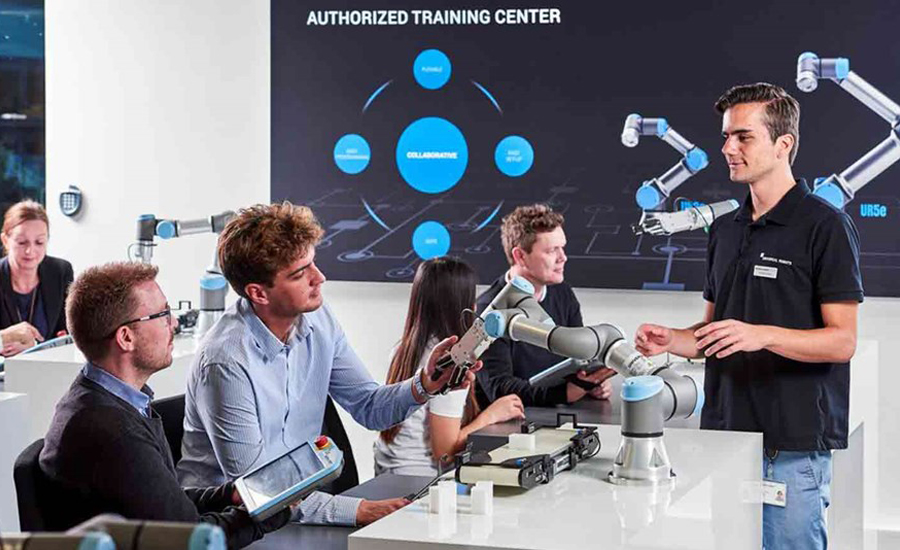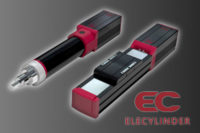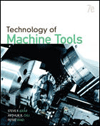An education program developed by Universal Robots to teach people how to program and implement collaborative robots has been accredited by the International Association for Continuing Education and Training (IACET) and is now authorized to issue continuing education units.
Universal Robots is the first cobot manufacturer to earn such accreditation, which will enable the company to provide a comprehensive cobot training curriculum for students and industry professionals.
“With our education program, we’re addressing a tremendous need to provide cobot training as part of an integrated, accredited course,” says Joe Campbell, senior manager of applications development at Universal Robots. “This hands-on learning initiative will be instrumental in addressing the skills gap. It will get state-of-the art cobots into classrooms, offering students instant employability and manufacturers access to an up-skilled workforce.”
The program provides a clearly defined pathway for students to master cobot programming and deployment as part of an career in robotics and advanced manufacturing. Schools can now purchase a ready-to-go package from Universal that includes a complete curriculum, a UR cobot arm, and the hardware and software required to build actual industrial applications.
The 32-hour course was developed with assistance from Ritch Ramey, coordinator of RAMTEC (Robotics and Advanced Manufacturing Technology Education Collaborative), a network of 24 technical career training centers in Ohio.
“Being able to offer a complete, turnkey training program with an industry-recognized credential gives schools increased access to both private grants and government funding when bringing cobots into classrooms,” Ramey says. “It will make all the difference in the acceleration of student access to a real industrial robot that is both safe to operate in a classroom and easy to use.”
Upon completion of the course work, a student receives 32 course credit hours and an industry-recognized certification from Universal Robots. The course can be taught in high schools, dual-enrollment courses and colleges.
The program will also be offered to manufacturers seeking certified cobot training for employees. Industry professionals can attend classes either through local schools and career centers or in classes offered by Universal Robots’ authorized partners. Sending employees for certified robotics training developed by an accredited provider is often encouraged by local and state governments, which are increasingly reimbursing companies for the training costs.
“This is really a win-win,” says Campbell. “Manufacturers struggling to attract and retain skilled workers within automation can now easily train and encourage existing staff. Employees get a unique opportunity to receive a recognized certification that they can add to their resume for future career advancements.”
In addition to the formalized core curriculum, Universal’s education program package consists of a UR Cobot (either a UR3e or UR5e); 24 course licenses; a gripper demo kit; and a UR “academy hardware set,” consisting of a conveyor system (including a conveyor, encoder, two sensors and I/O simulation test box), 10 3D-printed training elements for exercises, a 3D-printed tool center point, and six 3D-printed workpieces.
For institutions that already have cobots, a retro package is available with course curricula, classroom support hardware and software.
Bob Graff, president of I4.0Strategies, consulting firm specializing in advanced automation training and credentialing, also helped develop Universal’s education program. His firm is now working with several UR+ partners in developing curricula for grippers and other peripheral equipment used in conjunction with Universal’s cobots.
“What separates Universal Robots from everybody else is the powerful, unique UR+ platform that enables manufacturers to build their complete cobot application by choosing UR-compatible products that are tested and proven,” he says. “Bringing courses on UR+ components and kits into the umbrella of UR’s credentialed training approach will spark a revolution in educational access to these Industry 4.0 technologies.”
To receive IACET accreditation, the recipient “demonstrates a commitment to excellence in continuing education and training in a review process involving extensive hands-on evaluation and verification with policies and processes thoroughly benchmarked against ANSI and IACET standards. The accreditation confirms that recipient has engaged the expertise of instructional design professionals nationwide to make its continuing education and training the best it can be.”










